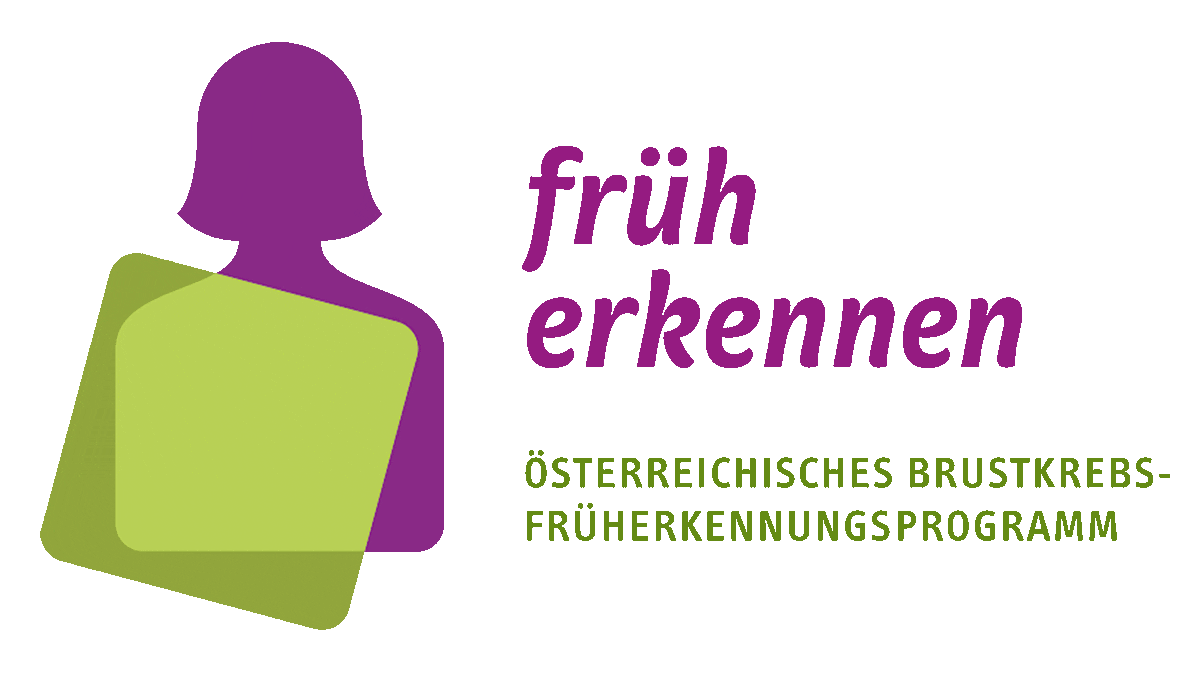For Doctors

Eligibility
All women in Austria between the ages of 45 and 74 who are insured with a health insurance provider (1) participating in the breast cancer screening programme are eligible to participate.
- Opt-in possibilities
-
All women (2) aged 40–44 and 74 and over with no upper age limit can opt in to participate in the programme.
- Screening interval
-
Regular screening is carried out every two years by mammography. The authorisation for the next mammography within the framework of the BKFP automatically becomes active 24 months after the last mammography. Irrespective of this, doctors can make a referral for diagnostic mammograms at any time if a woman has problems or symptoms of breast cancer, during treatment or aftercare following breast cancer or if there is an increased risk of breast cancer in the family. Should the screening mammogram or ultrasound examination reveal an unclear finding (BIRADS III finding), a follow-up examination will be scheduled for six to twelve months time. In addition, further clarification by means of an MRI examination can be carried out at any time.
- Use of ultrasound (sonography and tomosynthesis)
-
The BKFP always uses sonography in conjunction with mammography, if necessary. The use of sonography is recommended in the case of ACR density C and D. It is also recommended if there is an indication for it from the mammography, the medical history or the palpation. The use of tomosynthesis in the program is possible, currently >80% of all sites use TS.
- Examiners
-
Radiologists who wish to participate in the programme must pass a multidisciplinary course and a course for diagnostic examiners and provide a positive performance test in rating a collection of cases in order to participate in the programme as diagnostic examiners. They must then be able to prove that they have performed at least 2,000 mammography examinations per year within the programme in order to be able to continue working for the BKFP.
Practices are subject to strict quality regulations, including the exclusive use of digital mammography systems or regular external quality assurance measures. In addition to the examiners, each practice must also demonstrate a minimum of 2,000 mammograms per year.
- Assessment
-
If suspicious findings are detected as part of the programme, the screening practice where the diagnosis has been made must refer the woman in question for a follow-up or for assessment or for any treatment planning required. The strict quality regulations of the screening programme also apply to assessment centres that carry out follow-up examinations.
The assessment is divided into additional imaging examinations (additional mammography images, ultrasound examinations or MRI of the breast) or invasive measures such as image-guided biopsies.
- Independent double reading of mammograms
-
As part of the BKFP, an independent double assessment is carried out – with no additional appointment required for women. The first and second examiner each prepare a report on the radiological density (D 1–3) without consultation between the two and classify the final result according to BIRADS (1–6). However, only the first examiner sees the women and therefor can perform a sonography if necessary.
If the results of the two findings are not congruent, they will be discussed in a consensus conference, during the course of which a final classification, coding and thus reporting will be achieved.
- Data collection
-
Data is recorded in defined data record forms and transmitted pseudonymously from all practices in Austria to a central office.
Evaluation is carried out by the Department of Medical Statistics of the Medical University of Graz, and Gesundheit Österreich GmbH on behalf of the Federal Ministry of Health. Within the framework of the evaluation, a comparison is made with the comparative parameters prescribed in the European guidelines in order to document the high-quality work in Austria and the fulfilment of the EU standards.
- Invitation system
-
Women between 45 and 74 years of age with valid health insurance with a provider participating in the BKFP and complete personal data (name, date of birth and mailing address) will automatically be able to participate in the BKFP from their 45th birthday. The e-card authorisation is activated on the first day of the month in which the woman turns 45. The e-card authorisation is then automatically activated for the BKFP every two years after a screening mammography or diagnostic mammography.
If a shorter-term follow-up examination is necessary based on a BIRADS 3 classification, the e-card authorisation will be activated for the BKFP again after 6 to 12 months. In addition to e-card authorisation activation, the insurer will send a reminder of the breast cancer screening examination.
Women between 40 and 45 years of age and from 70 years of age can register for the BKFP by telephone using the BKFP service line 0800 500 181, by email to serviceline@früh-erkennen.at, online at www.frueh-erkennen.at or via „MeineSV“ with mobile signature (opt-in).
Women’s participation in the BKFP is supported by the programme management using appropriate PR measures and information initiatives.
- Evaluation
-
As part of the evaluation, it is possible to trace patient pathways and draw conclusions from medical events via the pseudonyms of the participants.
- Supervision
-
The Austrian Agency for Health and Food Safety is responsible for technical quality assurance; the Academy of Physicians GmbH is responsible for fulfilling and maintaining the personal qualifications of the examiners. Practice-related frequency is evaluated by the Austrian Society for Quality Assurance & Quality Management in Medicine GmbH (ÖQMED).
Radiological matters are dealt with by a separate certification commission, which consists of five radiologists. In addition, each Austrian province has a radiologist responsible for coordinating medical activities. This radiologist receives the pseudonymised feedback reports of the screening practices active in his or her province from the Medical University of Graz.
After each quarter, each site and each examiner in the programme receives a feedback report from the Medical University of Graz with an evaluation of the cases processed in each case, as well as the anonymised results of the histological examinations of any tumours found.
Only the screening practice can trace this data back to a specific woman, receiving feedback on the results of its own patients. This is an essential step in ensuring medical quality.
Evaluation report for the period 2014 to 2021 - Further training
-
In connection with the programme, a number of training opportunities are offered – both web-based and in-person, such as licensed training events with lectures by experts. In addition, diagnostic examiners are offered the opportunity to work on practice collectives with difficult, i.e. challenging, cases.
- Upper Austrian Health Care Institutions: Health Care for Civil Servants of the Provincial Capital Linz, Health Care for Municipal Civil Servants of Upper Austria, Health and Accident Care for Provincial Civil Servants of Upper Austria, Upper Austrian Teachers‘ Health and Accident Care, Health Care Institution for Civil Servants of the Municipality of Steyr, Health Care for Civil Servants of the City of Wels.
- Health insurance fund for civil servants of the municipality of Bad Gastein
- Health care institution for civil servants of the municipality of Hallein
- Private insurance companies
- Foreign insurance companies (e.g. embassy staff of other countries)
The following health insurance providers are currently not participating in the programme:
This is also the case for women who do not have a valid insurance with a health insurance company in Austria.
